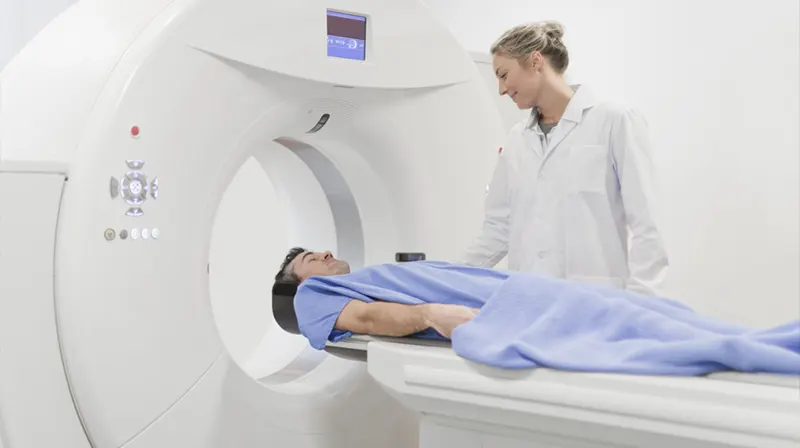MRI or CT Scan with Contrast: When is it Unsafe?
April, 2020
Cyrus Khorrami, MD
Radiologist, Medical Director

Q: What Is Contrast and Why Is It Used?
Contrast is a liquid that doctors and radiologists use along with scans like CTs and MRIs to diagnose different conditions and illnesses. It is used to outline internal structures of the body and to provide greater detail to detect disease. Contrast is typically given either orally, ingested prior to or between scans, or intravenously through an IV. Both are effective in their own ways when helping to make a diagnosis.Oral contrast is a while liquid that contains barium, consumed prior to the examination. Once ingested, the barium solution appears white on x-rays and CT Scans. This helps the radiologist distinguish between what is bowel and potential disease. The oral contrast does not taste great, but is widely considered to be safe. The chances of a patient having an adverse reaction including an allergic reaction in is incredibly rare.IV contrast is either a non-ionic iodine based liquid (for CT scans) or a gadolinium based liquid (for MRI scans). Because it is administered through the veins, the contrast is able to highlight the blood vessels and organs the same way oral contrast highlights the bowels. IV contrast can help find blood clots, cancer, and other masses hidden inside of organs.Some scans are done without contrast simply because the contrast may not be needed for what the doctors are looking for. For example, if your doctor is searching for cancer or infection, contrast is usually required. However, contrast is not necessary for a CT scan that is looking for kidney stones or brain injury. Generally, an MRI of the spine that is looking for a cause of back pain will not require contrast. Your doctor and the radiologist will work together to determine whether it is appropriate for you to receive contrast.
Q: Is Contrast Dangerous?
In general, allergic reactions vary among people. For example, a peanut allergy can vary from a little itching to hospitalization. It has been reported that up to 8% of people receiving IV contrast could have an allergic reaction. Most of these reactions are mild, and include a feeling of warmth, hives, itching, nausea and vomiting. These reactions are easily treated with Benadryl. Severe, life-threatening reactions, including anaphylaxis, are extremely rare and occur in 0.1% of people receiving contrast. At my facility, a physician is always a few steps away from each patient receiving IV contrast and has a large assortment of medications at his disposal for quickly treating any potential complications.Patients who have a know allergy to contrast may be medicated before receiving the contrast. These medications typically include Benadryl and Prednisone. Medicating beforehand is not 100 percent effective, but the chances of any major complications are very low.
Q: I am allergic to shellfish. Can I still receive intravenous contrast?
There is a myth that patients that are allergic to shellfish are allergic to the iodine contained within shellfish and therefore would be allergic to the iodine containing IV contrast. This is untrue. Iodine allergy is a myth. Iodine is found within all of our thyroid glands. It is also in table salt. A shellfish allergy is caused by a muscle protein called tropomyosin. A person with a shellfish allergy has no more risk of being allergic to IV contrast as they do of being allergic to fruit or eggs.
Q: What is renal function?
What does that have to do with contrast safety? Renal function simply means how well your kidneys are functioning. Another reason that patients may not be able to receive contrast is because they have poor renal function. The physician who is ordering the scan will make the determination as to whether you’re able to receive the contrast with your current renal function.
Q: How do I know if my kidneys are functioning properly?
As we get older, like may things in our body, our kidneys sometimes do not function as well. Other conditions such as diabetes, high blood pressure, smoking, and high cholestrol can damage the kidneys over time. A simple blood test can determine a persons renal function and whether they can safely have contrast.
Q: What is renal function have to do with contrast safety in CT scans?
Patients with normally functioning kidneys can receive CT contrast without fear that their kidneys will be damaged. However, CT dye can potentially worsen renal function in a patient who already has poor renal function. Patients are given as little contrast as possible in order to protect their kidneys. Drinking lots of water helps protect your kidneys from the adverse effects of CT contrast. Patients who are currently receiving dialysis are able to get CT contrast if they are going to be dialyzed within 24 hours of receiving the contrast intravenously.
Q: What is renal function have to do with contrast safety in MRI scans?
MRI contrast is much safer for patients with poor renal function. However there is a condition called nephrogenic systemic fibrosis. This is an extremely rare disorder that affects the skin. It is has been linked to patients with extremely poor renal function receiving MRI contrast. Therefore patient who are on dialysis cannot receive MRI contrast.Contrast is safe for most patients with only a few exceptions as we have discussed above. As always, please feel free to call this office so our staff can help answer any of your questions.